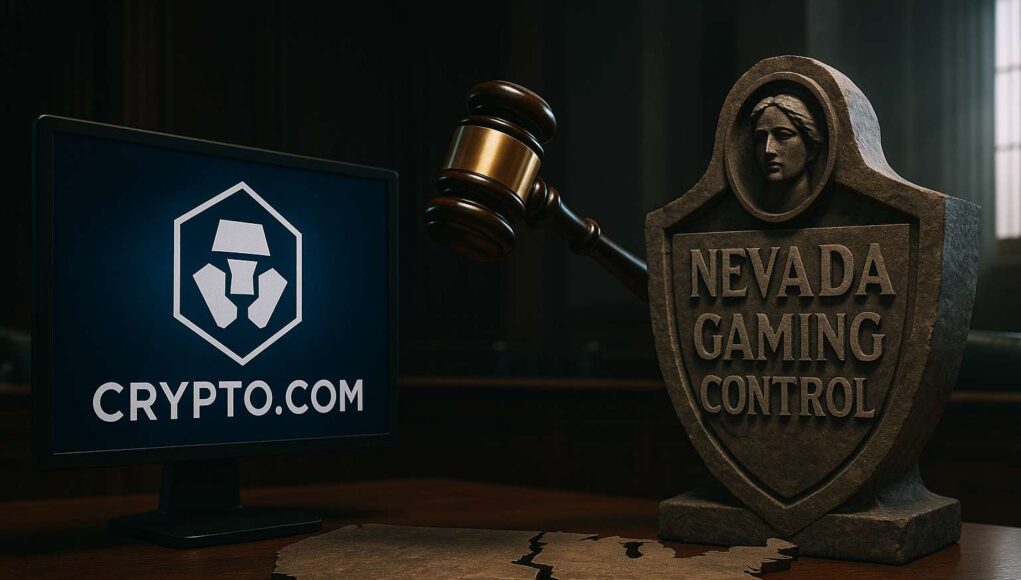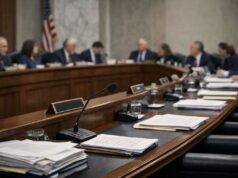Crypto.com has launched a legal challenge against the Nevada Gaming Control Board, joining a growing list of companies confronting state regulators over bans on sports and event-based contracts. The Crypto.com Nevada lawsuit closely mirrors Kalshi’s earlier legal battle and marks a pivotal escalation in the broader clash between innovation in prediction markets and entrenched gambling oversight.
Crypto.com Nevada Lawsuit: The Latest Flashpoint
On June 5, 2025, Crypto.com filed its lawsuit against the Nevada Gaming Control Board. The filing came just hours before a regulatory ultimatum would have forced the company to halt operations related to event-based contracts. The platform had attempted to offer contracts on the outcomes of sporting events and potentially political and entertainment predictions. Crypto.com argues these markets should fall under federal commodities law, not state gambling rules.
Nevada regulators disagreed. They labeled such products as unlicensed gambling and threatened enforcement. This prompted Crypto.com to seek judicial relief, citing recent federal court rulings and its right to operate under Commodity Futures Trading Commission (CFTC) oversight.
Kalshi’s Legal Momentum
More importantly, the Crypto.com Nevada lawsuit draws heavily on legal precedents set by Kalshi, a federally approved event contracts platform. Kalshi faced similar pushback from regulators in both Nevada and New Jersey. In April 2025, it secured a preliminary injunction from a federal court. The ruling halted Nevada’s attempt to block its markets.
Kalshi maintains that its contracts serve as legitimate hedging tools for real-world risks, akin to financial derivatives. They argue these are not speculative gambling instruments. Kalshi’s legal success has emboldened other platforms, including Crypto.com, to challenge state-level enforcement as inconsistent and unconstitutional.
A Growing Jurisdictional Rift
To make matters worse, the broader U.S. regulatory environment has become increasingly fragmented. States like Maryland, Illinois, Ohio, and Arizona have issued cease-and-desist letters to Kalshi, Crypto.com, and Robinhood over their event market offerings.
At the heart of the issue lies a jurisdictional dispute. Are these contracts commodities under CFTC regulation, or gambling products under state authority? The answer remains unclear. While the CFTC has shown openness to permitting such markets, state regulators remain hostile, especially when sports or political outcomes are involved.
The Crypto.com Nevada lawsuit amplifies this tension. It demands legal clarity on who truly oversees these evolving financial instruments.
Implications for the Prediction Market Industry
The outcome of this legal standoff could determine the future of prediction markets in the United States. States may be forced to back off if federal courts continue to side with companies like Kalshi and Crypto.com. They may also need to redefine how they approach event-based financial products.
>>> Read more: Robinhood Investigated for NCAA Event-Based Contract Feature
A favorable ruling in the Crypto.com Nevada lawsuit could pave the way for wider adoption of prediction markets regulated under federal law. That would allow platforms to bypass state gambling restrictions. On the other hand, if state authorities prevail, it may cement a fragmented regime. Platforms would have to navigate 50 separate interpretations of legality.
As companies continue to test the boundaries of financial innovation, the prediction market sector stands at a legal crossroads.
Readers’ frequently asked questions
Can I trade prediction contracts on Crypto.com now?
No. As of June 6, 2025, Crypto.com is in a legal dispute with Nevada regulators. Until the case is resolved or the court issues further orders, the availability of event-based contracts on the platform remains uncertain.
Does the Commodity Futures Trading Commission (CFTC) regulate prediction markets?
Yes. The CFTC has jurisdiction over certain types of event contracts when they qualify as commodities or derivatives. Kalshi, for example, operates under CFTC approval. However, state regulators may still object depending on how the contracts are categorized.
What is the legal status of Kalshi’s operations in Nevada after the injunction?
Kalshi obtained a preliminary injunction from a federal court in April 2025. This halted Nevada’s attempt to block the company from offering event contracts. As a result, Kalshi is currently permitted to operate in Nevada under federal oversight, pending further legal review.
What Is In It For You? Action items you might want to consider
Follow regulatory rulings on prediction markets
Keep an eye on developments in the Crypto.com Nevada lawsuit and similar cases involving Kalshi. These rulings could influence the future legality of event-based trading platforms nationwide.
Reassess market access strategies if operating in the U.S.
If you’re a fintech or crypto company exploring event-based markets, evaluate your exposure to conflicting state and federal regulations. Legal outcomes could shape which states are accessible or off-limits.
Track federal vs. state jurisdiction trends in CFTC-regulated products
Prediction markets are at the center of a regulatory turf war. Traders, developers, and investors should monitor how the courts rule on the CFTC’s authority versus that of state gaming boards.










